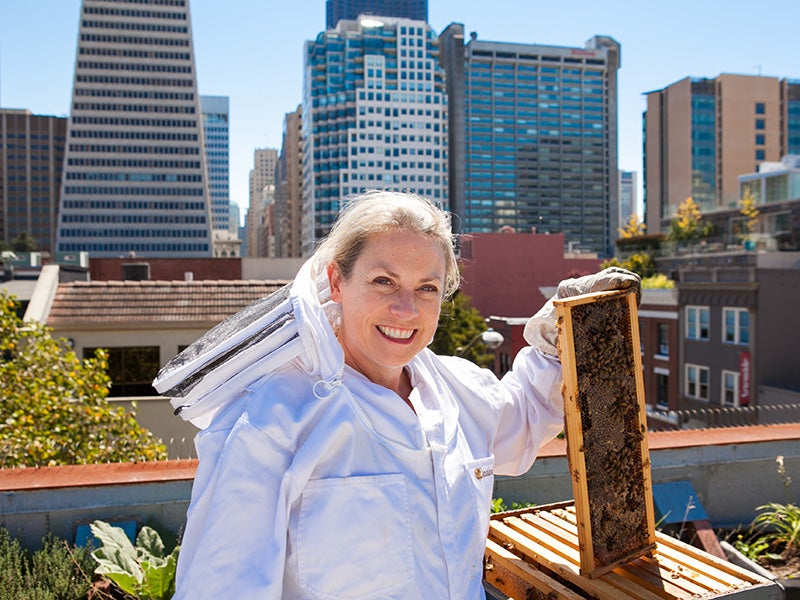Listen To The Bees
I’m not an academic, not a scientist, nor a policy maker. I’m just a mom and a beekeeper who sees bee’s disappearing; and I’m terribly worried.

This page was published 11 years ago. Find the latest on Earthjustice’s work.
People must be thinking, what’s all this buzz about bees?
These essential insects have been in the news a lot lately because they are disappearing in devastating and unprecedented numbers. And science is finally giving us some answers.
Their disappearance is our flash warning of a food system that is broken and needs to change.
I’ve practiced urban beekeeping since 2008. For the last four years, I’ve tended bees on various rooftop gardens in San Francisco. They pollinate neighborhoods like Jackson Square, Nopa, Hayes Valley and Washington Square while producing honeycomb for Quince, nopa, Jardinière Restaurants and Tony’s Pizza Napoletana.
I’m not an academic, not a scientist, nor a policy maker. I’m just a mom and a beekeeper who sees bee’s disappearing; and I’m terribly worried.
In my work as a beekeeper, I have discovered that bees are a delivery system, bringing the heart and soul of nature right to our table. Bees are just the right species to help people understand the fragile connection between our health and the health of the planet.
While the situation is frightening, here’s the good news: More and more people are finally listening to and understanding what is happening to the planet. It is clear that the public is paying attention. I see the public is ready to act.
People understand that what happens to bees happens to us. When we save the bees, we also save ourselves. The importance of a healthy food system is finally sinking in for many people. Bees are telling us this in a most tangible and visceral way. I believe the need to save the bees is what will finally spark humanity to take the actions needed to save ourselves from ourselves.
And here is more good news: There are simple ways every one of us can help make a difference.
Nearly all big-box stores sell mass-produced seeds and plants that have been treated with systemic insecticides such as neonicotinoids. I politely asked my local hardware and garden store, Cole Hardware in San Francisco, if they would consider selling neonic-free plants to help keep bees safe. They agreed. They told me that they truly do not want to kill any pollinators.
This June, Cole Hardware will launch a Bee Safe Campaign and will clearly display which plants are organic and safe for pollinators. In San Francisco, they will be our one-stop shop for safe plants we can trust.
Imagine if everyone requested the same of their local garden and hardware store. As a consumer, you can do this, too. Contact your local independent and chain garden and hardware stores and ask them to please make sure they are not harming bees by selling non-organic, pesticide-laden seeds or plants.
Another way you can help is by supporting groups like Earthjustice, who are working hard to protect the environment and bees from dangerous pesticides at the national level.
If you like apple pie at Christmas, pumpkin pie at Thanksgiving, and guacamole for Super Bowl—all foods that will soon be too difficult and expensive for farmers to produce if we don’t protect our bee populations—please help us clean up our food system by reducing and eliminating pesticides. If you don’t want your salads and fruits to be replaced by cheaper foods that don’t require pollination such as grains and corn, please join us in this work to reclaim our food system.
If we fail to act, we will be left with a broken and untenable farming and food production system that does not support life. Creating safe havens for all pollinators should be at the top of the list of policy makers and the EPA.
All the pollinators—Monarchs, bumblebees, and native bees—are communicating that now is the time for us to take action. Pollinators work tirelessly to connect us to our sustenance though the delicate balancing act of soil, sun and rain. I say tirelessly, because it’s a vast amount of work for pollinators to give us this rich, bountiful life.
It’s not magic why we’re here. It’s pollination! We evolved alongside pollinators and we developed based on their nutritional gifts. Bees and butterflies are telling us that we won’t get along without them. Our treatment of these delicate and necessary, beneficial insects will inform the balance of our world. The future begins now. Please listen to the bees.
This guest blog post is written by Terry Oxford, an urban rooftop beekeeper in downtown San Francisco. A graduate of UC Berkeley, Terry has been a long time activist and environmentalist. She learned about the interconnection of plants and pollinators while working at TreePeople in Los Angeles in the early 90’s.
Terry’s focus is natural, sustainable beekeeping and her goal is strong and healthy bees that require little human intervention and interference. Our farming practices have brought bees to their knees and it’s doubtful that technology and business as usual will save them.
Learn more about Terry at UrbanBeeSF.com.
Action Alert: Save the Bees
Bee populations are plummeting, yet the U.S. Environmental Protection Agency recently sided with Dow AgroSciences to approve the new pesticide sulfoxaflor that is highly toxic to bees. Take action and urge the EPA to deny Dow’s application to expand the registration of sulfoxaflor.
The California Regional Office fights for the rights of all to a healthy environment regardless of where in the state they live; we fight to protect the magnificent natural spaces and wildlife found in California; and we fight to transition California to a zero-emissions future where cars, trucks, buildings, and power plants run on clean energy, not fossil fuels.